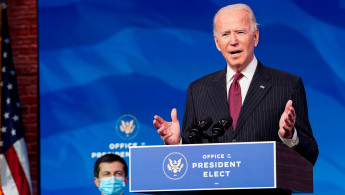Follow us on Facebook, Twitter and Instagram to stay connected
Biden's foreign policy will be 'deeply problematic' to Israel, Saudi Arabia, analysts say
A former US ambassador to Israel and a Middle East expert at the Council on Foreign relations have said that Biden's foreign policy could upset Israel and Saudi Arabia
3 min read
Joe Biden will have to deal with his predecessor's actions in the Middle East [Getty]
Maneuvering a strong relationship with Saudi Arabia despite its human rights abuses and repairing the nuclear deal with Iran are among US President-Elect Joe Biden’s most pertinent priorities in the Middle East, two Middle East analysts have told the US think tank, the Council on Foreign Relations (CFR).
Outgoing US President Donald Trump is withdrawing US troops from Afghanistan and Iraq, and sponsoring normalisation agreements between Israel and several Arab states including the UAE, Bahrain and Morocco.
Joe Biden will be inaugurated early next year and will have to contend with his predecessor’s decisions.
Speaking during a CFR podcast, former US Ambassador to Israel Martin Indyk said that a Biden presidency is concerning to the United Arab Emirates, Israel and Saudi Arabia – traditional allies of the US.
"America’s friends [in the Middle East] are definitely concerned," he said.
"When they look at Joe Biden they don’t see him as the incoming president, but as Barack Obama’s Vice-President. And they had a real problem with Obama’s policy. They are
aware that Biden wants to go back to the nuclear deal with Iran, which they found highly problematic because it didn’t deal with the other activities of Iran in the region, which were destabilising.
"The Israelis have a similar concern about Iran. Netanyahu said publicly twice during this transition period that he is opposed to the United States going back to the nuclear deal.
|
"There’s a real concern in both the Israeli leadership and the Gulf Arab leadership and President Sisi of Egypt that what we’re going to see is a return to policies deeply problematic to them."
Steven A Cook, who is the Eni Enrico Mattei senior fellow for Middle East and Africa studies at the CFR, said that Saudi Arabia will have to renegotiate its relationship with the US under Biden.
"It’s clear the US-Saudi relationship will be relitigated in Washington," he said.
"There are a variety of issues: Saudi’s intervention in Yemen, arms sales to Saudi Arabia, the jailing of activists, the murder of Khashoggi, the Saudis in particular will have a difficult time in dealing with the Biden administration at the very least if Biden speaks up about human rights. That is going to be hugely different from what the Trump administration has done."
Indyk added that despite recent normalisation of ties with Israel by Morocco, Bahrain and the UAE, Biden is unlikely to place relations between Israel and the Arab states at the top of his agenda.
"Joe Biden’s been around American foreign policy for a long time," Indyk said
"He has a history of opposing military interventions. He approaches the region with a degree of scepticism. He knows the players well. He is a strong advocate of focusing on China and climate change."
The former US ambassador to Israel added, "Biden saw how impossible it was to move [leadership in] Israel/Palestine so he won’t be listening to the siren song of the Middle East peace-making. He knows you can’t ignore the Middle East but he will be far more focused on the nuclear deal with Iran and containing problems elsewhere."





 Follow the Middle East's top stories in English at The New Arab on Google News
Follow the Middle East's top stories in English at The New Arab on Google News


